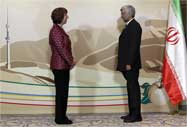 ALMATY, Kazakhstan (Dispatches) -- Six nations and Iran worked Friday to find common ground at negotiations that would satisfy both Tehran's demands for international recognition of its right to advanced nuclear technology and the West's call on the Islamic Republic to rein in its nuclear program.
ALMATY, Kazakhstan (Dispatches) -- Six nations and Iran worked Friday to find common ground at negotiations that would satisfy both Tehran's demands for international recognition of its right to advanced nuclear technology and the West's call on the Islamic Republic to rein in its nuclear program.
The two sides parted in February after a previous meeting in the Kazakh city of Almaty with agreement to at least keep talking over a new proposal submitted by the six - the United States, Russia, China, Britain, France and Germany.
Iran wants an end to punishing sanctions crippling its economy. They were imposed to force it to end uranium enrichment. Iran says it has a right to enrich under the Nuclear Nonproliferation Treaty and describes demands that it stop enrichment as illegal.
"We are talking about peaceful nuclear energy," Saeed Jalili, Iran's chief nuclear negotiator, said before the two sides sat down Friday at one of the city's five-star hotels. He said Iran had a right to such a program and accused "a handful of countries" of working "to deny this right to others".
The six have moved from demanding a total end to enrichment. As a first step, they now are asking Tehran only to stop production and stockpiling of uranium enriched to 20%.
The meeting broke for lunch after about three hours with no indication whether progress had been made.
The meetings Friday and Saturday are at best expected to achieve enough progress for agreement to hold another round of talks. But after 10 years of inconclusive negotiations, even an agreement to keep talking would give both sides short-term gains.
Iranian negotiator Ali Bagheri told reporters "what is being referred to as confidence-building measures are actions that both sides ... need to take" simultaneously.
He gave no specifics, but the comment could be an allusion to Iranian demands of sweeping sanctions relief instead of the offer from the six offering only a limited lifting of sanctions.
It also wants any nuclear concessions it makes to have specific limits instead of leading to others. Alluding to that demand, Bagheri said his country wanted to nail down "the start of the process, the dimensions of the process and the final outcome of the process".
And he described any would-be nuclear deal as only "part of a comprehensive process", suggesting Iran was still holding to its earlier demands of a broader deal also addressing security issues.
UN Secretary General Ban Ki-moon hoped for "very meaningful progress" from the negotiations.
The diplomatic process will probably be slow and fraught with challenges, said Iranian Deputy Foreign Minister Abbas Araghchi, a member of the country’s nuclear negotiating team. Iran should be rewarded with the lifting of sanctions along the way or it won’t continue on the path, Araghchi said.
“If there is balance between steps to be taken by the two sides, we likely will be able to start a new approach, and this new trend will be long and will require many steps,” he was quoted as saying in an interview with the Mehr news agency. “There are great obstacles” that require “patience and resistance” to overcome, he said.
While a resolution is “highly unlikely,” both sides should step back from “the confrontation cliff,” Ali Vaez, an Iran analyst in Washington for the International Crisis Group, and co-author Karim Sadjadpour wrote in a report published by the Carnegie Endowment for International Peace.
